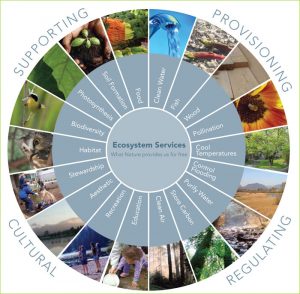
Ecosystem services are those functions of natural systems that provide value to humans free of charge. Ecological land management enhances ecosystem services such as pollination, flooding control, carbon storage, biodiversity, and recreation. Graphic credit: TEEB Europe
Ecosystem services are those functions of natural systems that provide value to humans free of charge. Examples include providing materials (e.g., food and fiber), improving water quality, providing wildlife habitat, crop pollination, soil formation, temperature regulation, mitigating storms and floods, buffering pollutants, and supporting a wide array of cultural benefits, recreational opportunities and aesthetic values. Development decisions taken without considering these benefits run the risk of inadvertently damaging the systems that foster them and reducing or destroying their value. Incorporating ecosystem service considerations into federal decision-making is a priority.
Fermilab supports and enhances ecosystem services on site through a variety of management practices. Land management focused on biodiversity of over 4,000 acres of natural areas addresses many of these services, such as clean water, pollination, carbon storage, wildlife habitat, photosynthesis and soil formation. The Fermilab Environmental Management System recognizes ecosystem services as an important environmental aspect. The Fermilab Ecological Land Management Committee participates formally in the environmental review (e.g., NEPA) process. The ES&H Manual includes sections on surface water management, wastewater discharges, oil pollution, and air pollution. The Lederman Science Center hosts 17,000 primary and secondary school students each year with educational programs on nature, prairies and ecosystem services. Recreation, an additional ecosystem service, is afforded at Fermilab because the site is open to the community for numerous activities, such as fishing, hiking, and birdwatching. Fermilab’s devotion to maintaining the site accentuates these services.

